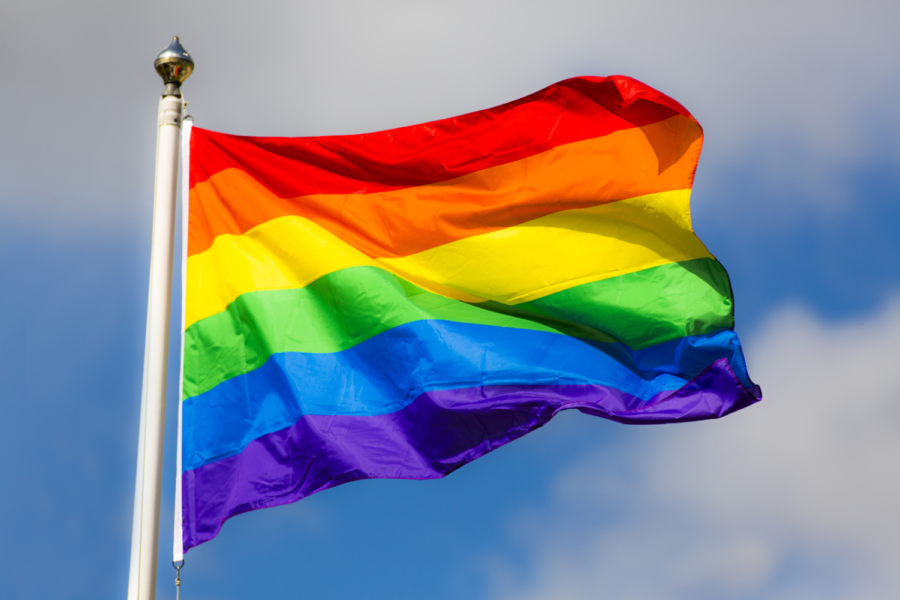LGBTQ+ acceptance at SHS
Rainbow flag. Photo credit: http://www.oxbridgeapplications.com/kyc/oxford-rainbow-flag-lgbt-history-month/
December 18, 2018
The LGBTQ+ community has been working for acceptance for many years. Throughout history there have been movements for LGBT rights, such as the Gay Liberation Movement in the 1960’s and 1970’s. But, there are also more recent movements, like the movement for marriage equality. While recent strides have been made towards equality and acceptance both nationally and in states, there still seems to be a stigma surrounding the LGBTQ+ community, and this can be seen through people’s language and actions in schools.
LGBTQ+ students are currently protected at Solon High School. SHS Principal Erin Short said they are treated the same as any other minority group.
“LGBT students are protected under our Anti-discrimination, Anti-harassment and Anti-bullying clause,” Short said. “We treat sexual orientation the same way as gender, race, religion, all the same.”
Short also said that the administration works to solve discrimination issues as quickly as possible.
“We’re pretty busy as administrators, but when things are reported to us about discrimination or harassment, we drop what we’re doing and nothing is more important than that,” Short said. “Because for us that’s about the physical and mental well-being of our students and that is the most important thing that we can provide here, a safe place for all human beings.”
In an anonymous survey of SHS students on LGBTQ+ acceptance, in which 35 people responded, only three people (8.3 percent) admitted to calling someone a derogatory word for LGBTQ+ individuals, but 14 people (40 percent) said they have used a word relating to the LGBTQ+ community as a joke or an insult. Of these 14 people, 6 said they use the words rarely and only two said they use them all the time.
“The word itself has empty meaning when I say it,” an anonymous survey participant said. “I don’t use it as a term in order to categorize LGBTQ+ people as inferior in any way, it’s just a common way to phrase a joke and make it funny.”
However, not all students shared this opinion. Many of them said that using words relating to the LGBTQ+ community was wrong in any context, and one even questioned why students use them.
“There are so many words in this language,” an anonymous student said. “Why would you bother dealing with the controversy when you could express yourself with similar or even larger effectiveness by using a different word altogether?”
Also, one anonymous LGBTQ+ student discussed their experience with acceptance in Solon.
“Solon, as far as suburban Ohio high schools go, is a pretty well integrated and forward-moving community,” the student said. “I have been overall comfortable with people knowing my sexual orientation and have struggled more with overcoming my own biases than being suppressed by the bias of others.”
SHS Psychologist and Gay-Straight Alliance (GSA) advisor Valerie Smith said that, in general, the SHS population is fairly accepting, and issues that may occur tend to be caused by a lack of education on the topic.
“I think that it’s less about the group or the school culture,” Smith said. “I think it’s more individuals. I think there are some individuals that aren’t accepting. I think most of it has to do with that they are just not educated on all of the issues, and they haven’t really taken the time and really thought about it.”
GSA President Laila Edelman said GSA is currently trying to tackle the lack of education on LGBTQ+ topics, beginning with its members.
“I think our biggest thing right now is education because we have a lot of students in [GSA],” Edelman said. “We’re trying to work from the inside out and hopefully teach them some things they might not know even if they are part of the LGBT community so that they can educate people around and it will expand outwards. I think that will ultimately help us make it a much safer environment for students.”
Short said she thinks the GSA club does a good job of bringing awareness to LGBTQ+ issues and promoting acceptance in the school, for everyone regardless of sexual orientation. She cited a study conducted on the connection between GSA clubs and suicide attempts in schools.
“I read a study that those schools have GSA or GLSEN [Gay, Lesbian & Straight Education Network] clubs, that are supportive of LGBT students… have a far lower suicide rate in straight males then schools that don’t,” Short said. “…The study discussed how schools that have those clubs are working towards creating… an inclusive-spirit where everybody feels safe. So, even students who are not gay or lesbian feel more comfortable being themselves.”
Additionally, Short said that empowerment, not only in students but also teachers, is a key factor to becoming a more accepting school and that it really comes down to being willing to discuss anything offensive that may occur.
“It’s about having the courage to have difficult conversations,” Short said. “… I just think it’s about being comfortable enough with ourselves and helping kids be comfortable enough with themselves… that if you see… anything that is offensive that we press pause and that we have the courage to have that difficult conversation… the more we do that the better we will be as a school system.”

